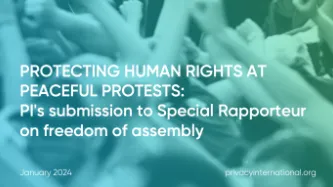Advanced Search
Content Type: Report
The rights to secrecy of the vote, privacy, political participation and non-discrimination were undermined in Argentina’s October 2025 legislative elections.Federal election authorities failed to ensure universal accessibility to a secret vote in the election. The fundamental human rights of certain people in Argentina's electorate, including those who are blind and have low vision, and illiterate people, were infringed upon. Read our report in full here. The October 2025 election…
Content Type: Advocacy
On 3 July 2025, the General Conference of the International Labour Organization (ILO) adopted a resolution committing the ILO to adopt a Convention supplemented by a Recommendation concerning decent work in the platform economy following a second discussion on this issue in 2026. PI welcomes the ILO's decision as a step in the right direction to protect platform workers who have been at the forefront of new forms of data exploitation in the workplace as we have been documenting for many…
Content Type: Long Read
In their gold rush to build cloud and AI tools, Big Tech is also enabling unprecedented government surveillance. Thanks to reporting from The Guardian, +972 Magazine, Local Call, and The Intercept, we have insights into the murky deals between the Israeli Government and Big Tech firms. Designed to insulate governments from scrutiny and accountability, these deals bode a dark future for humanity, one that is built using the same tools that once promised a bright, positive world.On 25 September…
Content Type: Long Read
In June 2025, a team of researchers exposed how Meta and Yandex abused Android and browser-specific tools to track users outside of their application and collect associated data. The technique used to achieve this was truly innovative, and akin to malware behaviour. It exploited protocols to break the isolation between apps and browser, a fundamental security concept meant to protect users. This allowed these companies to tie the browsing history of individuals with their accounts on the…
Content Type: Long Read
Period tracking apps and the rollback of reproductive rightsThe aftermath of the overturning of Roe v. Wade in the United States (US) sparked widespread debate and concern that data from period tracking apps could be use to criminalise those seeking abortion care.While the surveillance and criminalisation of reproductive choices are neither new nor unique to the US, the scale and intensity of today’s crisis continue to grow. To put it into perspective, 22 million women and girls of reproductive…
Content Type: Long Read
18th December is International Migrants Day, a day to recognize both the contributions and continued struggles of migrants across the world.Migrants continue to face an increased level of human rights violations through hostile immigration policies and practices. At borders and beyond, their fundamental human rights and dignity are being violated through old and new technologies. These systems in place reinforce the dehumanising rhetoric of migrants, who are merely seeking asylum and a better…
Content Type: Advocacy
In the wake of Privacy International’s (PI) campaign against the unfettered use of Facial Recognition Technology in the UK, MPs gave inadequate responses to concerns raised by members of the public about the roll-out of this pernicious mass-surveillance technology in public spaces. Their responses also sidestep calls on them to take action.The UK is sleepwalking towards the end of privacy in public. The spread of insidious Facial Recognition Technology (FRT) in public spaces across the country…
Content Type: Long Read
1. What is the issue?Governments and international organisations are developing and accessing databases to pursue a range of vague and ever-expanding aims, from countering terrorism and investigating crimes to border management and migration control.These databases hold personal, including biometric, data of millions if not billions of people, and such data is processed by technologies, including Artificial Intelligence (AI), to surveil, profile, predict future behaviour, and ultimately make…
Content Type: News & Analysis
Artificial intelligence decision making systems have in recent years become a fixture of immigration enforcement and border control. This is despite the clear and proven harmful impacts they often have on individuals going through the immigration system. More widely, the harms of automated decision making have been increasingly there for all to see: from systems that encode bias and discrimination, as happened in the case of an algorithm used to detect benefit fraud in the Netherlands, to…
Content Type: Long Read
Our briefing, “When Spiders Share Webs: The creeping expansion of INTERPOL’s interoperable policing and biometrics entrench externalised EU borders in West Africa”, explores the concerning human rights implications of the use of interoperable data-driven policing capabilities and biometric technologies in West African countries rolled out by the International Criminal Police Organisation (INTERPOL)’s European Union (EU)-funded West African Police Information System (WAPIS) programme. We make a…
Content Type: Report
Content Type: Advocacy
In May 2024, we made a submission for the forthcoming report of the UN Special Rapporteur on the right to education to the General Assembly in October 2024.
Amongst others we recommend the UN Special Rapporteur for this upcoming report to:
Underline the need for a human rights-based approach to all AI systems in the education sector and describe the necessary measures to achieve it.
Reassert that any interference with the right to privacy and the advancement of the right to education due to…
Content Type: Long Read
Social media is now undeniably a significant part of many of our lives, in the UK and around the world. We use it to connect with others and share information in public and private ways. Governments and companies have, of course, taken note and built fortunes or extended their power by exploiting the digital information we generate. But should the power to use the information we share online be unlimited, especially for governments who increasingly use that information to make material…
Content Type: Advocacy
At PI we have been observing with concern the rapid expansion of technologies in educational settings, which has included a wide array of tools that allow the surveillance of students and academic staff, to the detriment of their privacy and academic freedom. We consider this upcoming report as an essential platform to examine the intricate interplay between academic freedom, freedom of expression, and surveillance conducted by both public and private entities through Education…
Content Type: Report
The methodology employed for this report consists primarily of in-depth interviews held with grassroots political workers and representatives of collectives. The researchers interviewed 14 individuals from various social justice causes such as womens’ rights, climate change, transgender rights, students’ rights and the right to universal internet access in Pakistan. The experiences they have shared with the interviewers along with the real-time developments in the country’s law and order…
Content Type: Advocacy
Privacy International's response to the call of submissions of the UN Special Rapporteur on the rights to freedom of peaceful assembly and of association on the tools and guidelines which may assist law enforcement in promoting and protecting human rights in the context of peaceful protests. The Special Rapporteur's report will be presented at the 55th session of the UN Human Rights Council.While PI recognises the role of law enforcement can play in facilitating the enjoyment of freedom of…
Content Type: Long Read
18th December is International Migrants Day. It’s a day designated by the United Nations, dedicated to recognising the “important contribution of migrants while highlighting the challenges they face.”On this day we wish to recognise in particular the countless human rights violations that people experience at borders and within hostile immigration systems. We thank those who survive these violations for sharing with us and others their experiences of such violations, and for accepting to…
Content Type: Explainer
The Free to Protest Guide Pakistan has been created by adapting Privacy International's (PI) Free to Protest Guide UK according to the laws and policies of Pakistan, in collaboration with PI and local activists in Pakistan.The Guide has been published in English, Urdu, Punjabi and Pashto.DISCLAIMER: This guide forms part of PI's global work to highlight the range of surveillance tools that law enforcement can use in the protest context, and how data protection laws can help guarantee…
Content Type: Advocacy
Privacy International joined civil society efforts to call the South African Parliament not to approve the draft General Intelligence Laws Amendment Bill 2023 (GILAB), which was approved by the Cabinet and introduced in Parliament.
The Bill was proposed by the South African government, after the Constitutional Court found the Regulation of Interception of Communications Act of 2002 (RICA) unconstitutional on multiple grounds.
The draft Bill fails to meet the human rights standards on many…
Content Type: Long Read
Introduction
The 28th of September marks International Safe Abortion Day. It remains a day necessary to mobilise and raise awareness of the continued struggles women and girls face when accessing reproductive healthcare, including access to safe abortion. Across the world, abortion continues to be criminalised, restricted and in some places under attack. All of which constitute severe obstacles for women and girls to fully exercise their human rights, particularly their right to privacy, which…
Content Type: Advocacy
Our submission focussed on the evolving impacts of (i) automated decision-making, (ii) the digitisation of social protection programmes, (iii) sensitive data-processing and (iv) assistive technologies in the experiences and rights of people with disabilities.We called on the OHCHR to:Examine the impact that growing digitisation and the use of new and emerging technologies across sectors has upon the rights of persons with disabilities;Urge states to ensure that the deployment of digital…
Content Type: Advocacy
This was submitted by PI and EFF for the sixth session of the Ad Hoc Committee, which is due to consider the text in August 2023.
Our submission covers provisions in the chapters related to procedural measures and law enforcement, as well as international cooperation of the proposed UN Cybercrime treaty (full title: Comprehensive international convention on countering the use of information and communications technologies for criminal purposes). We also provide general comments on Article 54…
Content Type: Advocacy
Privacy International (PI) notes the Bureau’s text of the WHO convention, agreement or other international instrument on pandemic prevention, preparedness and response (“WHO CA+”).
PI has sought to closely follow and engage with the discussions leading up to the draft treaty, despite the significant limitations to civil society participation in the process. In February 2023, we intervened during the briefing organised by the INB bureau and published our comments on the zero draft of the WHO CA…
Content Type: Press release
Campaigners assembled outside Capita PLC’s Annual General Meeting in the City of London today (Thursday 11th May) are contesting the outsourcing company’s £114m contract to deliver 24/7 GPS monitoring services, used by the Home Office to surveil people without British citizenship.
Capita shareholders were greeted by a circling mobile billboard van and leaflets informing AGM attendees of the grave human rights and health risks associated with Capita’s GPS tracking contract. Charities Bail for…
Content Type: Advocacy
Privacy International welcomes the aim of the Cyber Resilience Act to bolster cybersecurity rules to ensure more secure hardware and software products. Nevertheless, we note that the proposal put forward by the European Commission contains certain shortcomings which could both hamper innovation and harm consumers who are increasingly relying on digital products and services.It is essential these shortcomings, detailed below, are effectively addressed by the EU co-legislators through the…
Content Type: Advocacy
The submission provides PI’s information and analysis of some of the topics listed in the call. The widespread use of new technologies presents both opportunities and challenges for the protection of human rights, including the right to life and the right to privacy. PI believes that is essential that states take a human rights-centered approach in their use of these technologies, and ensure that their use is consistent with international human rights law. By doing so, states can ensure that…
Content Type: Report
PI has been fighting against police using intrusive & disproportionate surveillance technologies at protests around the world for years. Unregulated surveillance and indiscriminate intrusions on our privacy have a chilling effect on the right to freedom of assembly.
We've fought to uncover the types of technologies that police secretly deploy at protests, and we have detailed how protesters around the world can try to protect their intimate and sensitive data from being captured by the…
Content Type: Advocacy
Following our comments on the draft Treaty text, PI's intervention, during the fourth session, focused on the provisions of the draft Treaty that deal with procedural measures and law enforcement. Specifically, we emphasised that the investigative measures contained in the draft Treaty should only be limited to serious offences only that are established by the Treaty. In addition, we urged delegates to remove a provision contained in the draft Treaty text that would allow authorities to exploit…



























